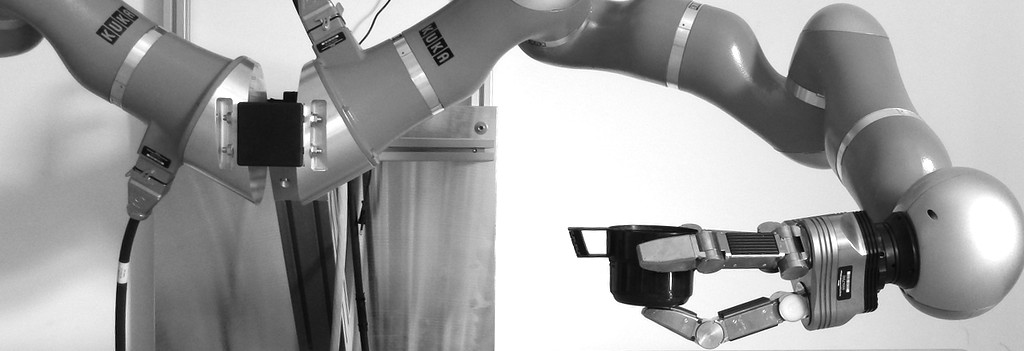Robotics in the 21st century: Challenges and Promises
September 25th - September 28th 2016
Landhotel Am Rothenberg
International Workshop funded by the Volkswagen Foundation and the HeKKSaGOn Network
Scope
Robotics is a continuously growing field where basic research makes advances across a wide variety of subfields and where industrial demands massively drive the publicly most visible developments. As a consequence there is a strong need to take care of the heavily interdisciplinary character of this field and to find measures for better integration of the different contributing scientific areas.
The International Workshop “Robotics in the 21st century: Challenges and Promises” will discuss: How to re-specify robotics and how to define the currently most relevant core research and development questions? The central question currently is: How can robotics in the 21st century better contribute to the advancement of basic research and at the same time maintain a leading role also for future industrial developments. This also concerns how robotics is situated in our society and how society perceives this field. To this end we have 42 internationally acknowledged speakers in seven sessions who will present their results and discuss these issues (see also detailed program).
Invitation
Attendance of this workshop is by invitation only. We will be able to accept about 50 participants and we expect all of them to contribute to the Workshop with a presentation. To apply please submit your 1 page CV and a 2-4 page extended abstract of your planned contribution for this Workshop. Your topic should be related to at least one of the scientific sessions (see detailed program).
We are specifically encouraging younger scientists to join this workshop
The program committee will select the 4 most exciting papers, which shall be given a 15 minutes slot for oral presentation. The others will present a poster.
Cost
The cost for this Workshop will be 200€ which will cover accommodation and full board for all accepted contributors. We will be able to provide limited travel support to participants. Please state your case in a cover letter if you wish to apply. Decisions about this will be made by the program committed based on quality and need.
Application
This workshop supports gender equality and therefore we are especially seeking high quality contributions from female scientists.
Please send CV and extended Abstract to our paper chair Prof. Dr. Katja Mombaur.
- Deadline for submissions is: June 15, 2016
- Notification by July 01, 2016
|
Prof. Dr. Katja Mombaur Ruprecht-Karls-Universität Heidelberg IWR - Optimization in Robotics & Biomechanics Berliner Str. 45 69120 Heidelberg
Tel. (+49) (0)6221 / 54-14870 (-14872) Fax (+49) (0)6221 / 54-14898 Email: kmombaur@uni-hd.de |
 |

1. Session: Motion and Adaptive Behavior Generation
Humans and animals move gracefully, fast, with high compliance, accuracy, and efficiency while being very robust with respect to perturbations. With a few impressive exceptions, it is – alas – still fair to say that these attributes do not yet apply to robotic motion. Take walking as an example. Explicit control (ZMP-control) works but renders often inflexible systems, which require very high computing power to calculate the fine points of the joints’ trajectories and result in much more conservative motions than can be observed in biological systems. Animals rely on implicit control mechanisms – often reflex based – which give them moment-to-moment flexibility on top of which motion planning takes place by ways of higher brain centers. Some robotic systems, which to some degree perform nicely, are trying the same, starting at purely passive walkers and extending this by some control mechanisms. However, these systems most often suffer from a lack of higher level (cognitive) motion planning, which according to our current knowledge would have best to be based on explicit control methods. So far, there is no unified perspective on these different – biological versus conventional – control concepts, and no successful attempts yet to bring them together. The different perspectives on motion control and generation should be the center of the discussion for this topic.
2. Session: Cognition and Semantics
here is still a massive difference between the very limited cognitive properties of robots and those of humans (even those of some animals). This problem is widely acknowledged and several streams have emerged during the last decades (for example – prominently – “embodied cognition”) or concepts of Object-Action Complexes and Structural Bootstrapping that have discussed this problem. Strong attempts have been made to better understand human problem solving not just as such but in conjunction with the development of algorithms that would allow robots to better “understand” their world. This session will, thus, address these issues and discuss the shortcomings of current cognitive robotics-approaches.
3. Session: Robotic Systems I
This session puts an emphasis on aspects of “classical” robotics approaches. Traditional engineering, mechatronics, sensing&actuation and other aspects have led and are still leading to the most impressive robotic- and automation systems in academia and industry (Asimo/Honda, ARMAR/KIT, Justin/DLR, NAO/Aldebaran, iCub/IIT, Atlas/BostenDynamic, HRP2/KAWADA, DB-CB/ATR) and very strong groups are operating here internationally. It seems therefore desirable in the context of this Workshop to provide an overview across the situation in this sub-field and to discuss it in conjunction with other “non-classic” fields for example those presented in Sessions 1-3.
4. Session: Learning and Autonomy
This topic has been chosen much in view of the (possible) conflict of current advanced developments in academic research and the still very few existing applications in industry of autonomous systems in robotics and automation. Clearly more and more statements have emerged during the last years where main industrial robotic developers or appliers have uttered the desire for more autonomy. Alas, there is a very wide gap between quite impressive autonomous robotic systems that have emerged from academic research and the very limited transfer of this to industry. As a consequence this session builds on this gap and wishes to suggest ways forward to bridge it.
5. Session: Industrial Perspecives
The session on industrial perspectives shall address the viewpoint from those partners who are first and foremost concerned with robotics applications. It will be interesting to see to what degree academic and industrial viewpoints match or clash. Also of interest will be to discuss how industrial requirements could actually stimulate research and foster novel ideas.
6. Session: Poster Session
7. Session: Robotic Ethics and Philosophy
Particularly academic robotic research envisions that robots may in the not-too-far future become highly capable and autonomous. Thus, society will then be confronted with artificial agents that might be very similar to humans. Too often has this scenario been put on display by the media and many a time in a flashy and unguided way. Thus, there are two central aspects that underlie this topic: (a) the need for and the definition of a shared human-robot ethics and (b) the urgent requirement to interact with the public and educate an understanding of the advantages and possible dangers of (autonomous) robots, the latter being possibly more important at this point of time. This session will, thus, address these issues for providing longer term perspectives of robots in our society.
8. Session: Interdisciplinary Robotics Aspects
Arguably these are the fields outside core-robotics to which the strongest interdisciplinary links exist. In spite of this, robotics remains often “shy” in adopting ideas from these fields. Clearly many times transfer to robotics of results from any biological substrate requires much algorithmic re-thinking and often massive alterations – an effort many of us do not wish to engage in. Still, it seems this is only part of the problem. Different cultures exist in the biological/psychological domains as compared to robotics leading to difficulties in cross-linking these fields. As a consequence currently there are a few bio/neuro-robotic systems existing none of which, however, has made into the domain of truly complex (e.g. humanoid) robots. A striking example is that there are no robotic manipulations systems existing as yet that operate “with neurons”. Humans do! Hence it should be possible even in an industrial context to achieve this with robots for example to arrive at more general assembly systems. The human brain project (HBP) attempts neural robotic control by a large scale effort. This session shall provide an overview across these fields and discuss not only the HBP efforts but also possibly other strategies to achieve more powerful biologically-modeled robot systems.
9. Session: Robotic Systems II
Massive and successful approaches have recently emerged in artificial intelligence (AI), for example data structuring, data/information mining (some current catch words are: “big data”, “deep learning”, etc.), planning, decision making, reasoning, etc. Most if not all of these approaches have focused on non-behaving systems addressing high level text and image information with the goal to structure the data and extract human-useful information. Robots need entirely different types of information though. Some examples are low-level aspects (“schemata”) for optimal manipulation or strategies for basic interaction with humans. This information is usually not present in text-related sources and Modern-AI cannot directly aid robotics. Several (mostly) European projects (like RoboEarth, RoboHow, Poeticon++, ACAT, Xperience, etc.) exist that try to bridge the gap between Modern-AI and Robotic-AI and it has been acknowledged that naïve transfer of data and methods between these sub-fields is not possible. This session will discuss communalities and differences between these fields, trying to arrive at better conclusions of how to bring this together.